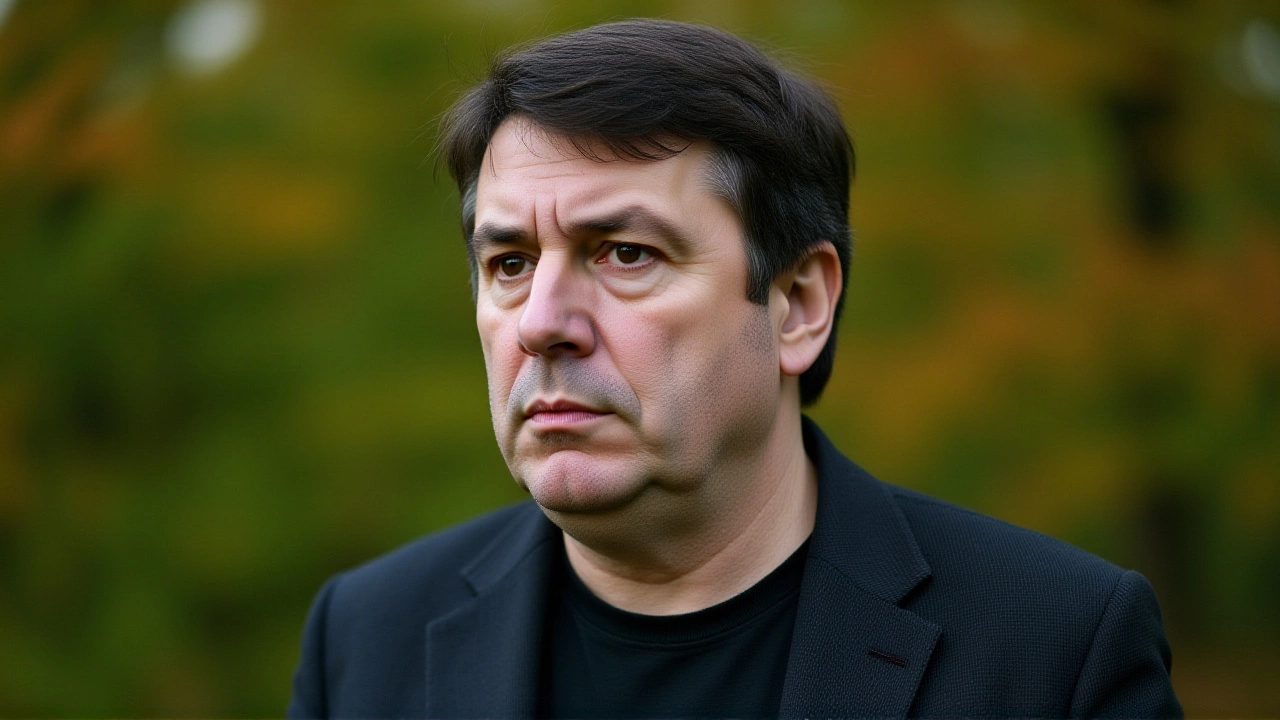When Graham Linehan, the Irish comedy writer behind ‘The IT Crowd’ and ‘Father Ted’, stepped off his flight at London Heathrow on September 1, 2025, he wasn’t greeted by a welcome mat—he was met by five armed Metropolitan Police officers. The arrest, triggered by social media posts he’d made over the previous year, sent shockwaves through Britain’s cultural and political landscape. Linehan, 57, had written on X (formerly Twitter) that ‘if a trans-identified male is in a female-only space, he is committing a violent, abusive act,’ and urged bystanders to ‘make a scene, call the cops and if all else fails punch him in the balls.’ That language, prosecutors argued, crossed a line from opinion into threat. But what happened next wasn’t just about one man’s words—it became a flashpoint in the UK’s unraveling debate over free speech, gender identity, and the limits of the law.
The Arrest That Split a Nation
Linehan’s arrest wasn’t random. According to his own Substack post, a U.S. gate agent had warned him something was ‘off’ before takeoff. He didn’t know then that UK authorities had already flagged his posts under the Public Order Act 1986. By the time he landed, the Metropolitan Police had secured a warrant. The timing was telling: just weeks after the UK Supreme Court had upheld restrictions on Scotland’s Gender Recognition Reform Bill, and as public tensions over gender policy reached a boiling point. Linehan, who also co-created ‘Black Books’, insisted his comments were satire, a ‘rhetorical flourish’ in a culture war he felt was being weaponized against him. But the law doesn’t care about intent—it cares about impact. And the Crown Prosecution Service decided the phrase ‘punch him in the balls’ wasn’t metaphorical. It was actionable.
The Trial: Acquitted on Harassment, Convicted on Damage
On November 25, 2025, after a two-week trial at a London magistrates’ court, the verdict came down. Linehan was cleared of harassment charges brought by transgender activist Sophia Brooks. The judge found no evidence he targeted her personally with threats. But the court found him guilty of criminal damage—specifically, smashing her mobile phone during a confrontation outside a London café in 2024. Linehan’s lawyer, Sarah Vine, described it as a ‘momentary lapse of control,’ not a premeditated act. Brooks, who testified via video link, said the phone was her only link to her support network after being doxxed online. The judge, whose name was withheld, made clear: ‘This court is not here to pick a side in public debate.’ Yet the verdict still felt like a verdict on culture.
Financial Penalty and the Appeal
Linehan was fined £500, ordered to pay £650 in court costs, and a £200 statutory surcharge—totaling £1,350 (roughly €1,536). His legal team immediately announced plans to appeal the criminal damage conviction, arguing the act was minor and occurred in the heat of a heated exchange, not as part of a campaign of intimidation. ‘This isn’t about whether trans people deserve safety,’ Vine said outside court. ‘It’s about whether a man can be prosecuted for a single act of property damage in the midst of a national controversy he didn’t start.’ The prosecution, meanwhile, maintained that even small acts of destruction, when tied to identity-based hostility, send a chilling message.

Stars, Politicians, and the Free Speech Firestorm
The fallout was immediate. J.K. Rowling, who has long been a vocal critic of gender identity policies, called Linehan’s arrest ‘utterly deplorable’ and ‘totalitarianism’ on social media. Elon Musk, owner of X, went further, labeling Britain a ‘police state’—a phrase that quickly trended globally. Then came Nigel Farage, leader of Reform UK, who announced he would raise the case before the U.S. House Judiciary Committee on November 26, 2025. ‘If they can arrest Graham Linehan for words, what’s next?’ Farage asked in a press briefing. His MP, Rupert Lowe, echoed the sentiment: ‘Linehan today, you tomorrow.’
The Free Speech Union, founded in 2019 by Toby Young, declared Linehan’s arrest unlawful and vowed to fund his appeal. ‘This isn’t about trans rights or anti-trans bigotry,’ said a spokesperson. ‘It’s about whether the state can criminalize speech that makes people uncomfortable—even if it’s crude, even if it’s offensive.’ The group, which has grown to over 120,000 members since 2023, has become the de facto legal shield for controversial figures in Britain’s culture wars.
The Police in the Crosshairs
Even the Metropolitan Police, the force that made the arrest, seemed conflicted. Chief Sir Mark Rowley, in a rare public statement to CBS News, admitted: ‘I don’t believe we should be policing toxic culture wars debates. Officers are currently in an impossible position.’ With 33,500 officers under its command, the force has been stretched thin by a surge in online hate crime investigations—many tied to gender identity. In 2025 alone, over 800 cases involving social media posts about trans people were reviewed by the CPS, up 210% from 2022. But few resulted in convictions. Linehan’s case was one of the few where the line between speech and action was blurred enough to warrant prosecution.

What This Means for the UK
This case didn’t happen in a vacuum. It followed the 2022 Gender Recognition Reform (Scotland) Bill, which sought to simplify legal gender changes. After legal challenges reached the UK Supreme Court in December 2023, the bill was blocked—but not before sparking nationwide protests and counter-protests. Now, in 2025, with Reform UK leading national polls, the issue has become political dynamite. Linehan’s trial wasn’t just about a phone. It was about whether the state should act as a censor of uncomfortable ideas, even when those ideas are expressed with aggression. And for many, the answer is clear: no one should be jailed for words. But should they be fined for breaking a phone?
What Comes Next?
Linehan’s appeal will likely reach the Crown Court by early 2026. Meanwhile, the government is quietly reviewing whether the Public Order Act needs modernization—particularly around online threats. But any reform will be politically explosive. The Free Speech Union is already drafting model legislation to protect ‘non-violent, non-incitement speech’ from prosecution. Meanwhile, LGBTQ+ advocacy groups are pushing for stronger protections against verbal harassment, even if it doesn’t rise to the level of physical threat. The tension isn’t going away. It’s just moving from Twitter threads to courtrooms.
Frequently Asked Questions
Why was Graham Linehan arrested if he was cleared of harassment?
Linehan was cleared of harassment because prosecutors couldn’t prove he targeted Sophia Brooks personally with threats. But he was convicted of criminal damage for smashing her phone during a 2024 confrontation. The law treats physical property damage differently than speech—even offensive speech. The court saw the act as a standalone offense, not part of a broader campaign.
What laws were used to justify his arrest?
The arrest relied on the Public Order Act 1986, which criminalizes threatening, abusive, or insulting behavior intended to cause harassment, alarm, or distress. While speech alone is protected, threats of violence—like ‘punch him in the balls’—can be prosecuted if deemed credible. The Metropolitan Police argued the phrase was a direct incitement to violence against a protected group under the Equality Act 2010.
How has public opinion shifted since the arrest?
Polls from November 2025 show 54% of Britons believe Linehan’s arrest was excessive, even if they disagree with his views. Support is strongest among those aged 45+, while younger voters are split. The case has galvanized the Free Speech Union’s membership by 37% since September, and Reform UK’s lead in polls has widened by 6 points—suggesting the issue is now politically potent.
Could someone else be arrested for similar posts in the future?
Yes. The CPS has issued internal guidance stating that ‘explicit calls for physical violence against protected groups’ remain prosecutable, regardless of context. But they’ve also acknowledged that ‘rhetorical hyperbole’ may not always meet the threshold. Linehan’s case sets a precedent: if the threat is specific, directed, and includes a call to action, even in a sarcastic tone, authorities may act.
What role did social media platforms play in this case?
X (Twitter) preserved Linehan’s posts as evidence, despite his claims they were satire. The platform’s algorithm also amplified his comments, making them more visible to activists and law enforcement. While X didn’t remove the posts, it cooperated fully with police requests for metadata—timing, location tags, and reply chains—that helped build the case against him.
Is this case unique, or part of a larger trend in the UK?
It’s part of a growing pattern. In 2024 and 2025, over 20 people in the UK faced criminal charges for social media posts related to gender identity. Only three resulted in convictions like Linehan’s. Most were dropped for lack of intent or insufficient evidence. But this case is notable because it involved a public figure, international attention, and a rare conviction for property damage tied to ideological conflict.
